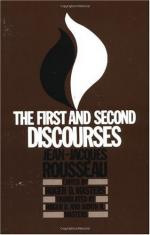
|
| Name: _________________________ | Period: ___________________ |
This test consists of 15 multiple choice questions and 5 short answer questions.
Multiple Choice Questions
1. How does the Introduction classify both Hobbes and Locke?
(a) Modern.
(b) Pre-modern.
(c) Classical.
(d) Ancient.
2. What does Rousseau say the increase of knowledge helps generate?
(a) Time for vice.
(b) Worthy philosophers.
(c) Science.
(d) Good behavior.
3. What is needed by arts according to Rousseau?
(a) Intelligence.
(b) Museums.
(c) Riches.
(d) Paint.
4. What reflects in the science it helped produce?
(a) Evil.
(b) Processes.
(c) Goodness.
(d) Intelligence.
5. What does Rousseau say might result only in ignorance?
(a) Moral behavior.
(b) Blindly following the philosophers.
(c) Studying art.
(d) Bad education
6. What does Rousseau say men can do in the present?
(a) Understand sciences.
(b) Deceive.
(c) Read Rousseau's book.
(d) Appreciate arts.
7. Why does Rousseau reject the notion of natural law?
(a) His royalty backers don't like the concept.
(b) He wants to contradict all the thinkers of his time.
(c) We do not yet know the nature of man.
(d) Locke favors it.
8. What displays apparent contradiction between virtue and enlightenment according to Rousseau in the First Discourse?
(a) Despotism and freedom.
(b) Monarchy and prisons.
(c) Government and philosophy.
(d) Sciences and arts.
9. What does Rousseau argue generates physics?
(a) Revenge.
(b) Idleness.
(c) Secrecy.
(d) Greed.
10. What does Rousseau say matters little in the pursuit of virtue?
(a) Education.
(b) Art.
(c) Philosophy.
(d) Work.
11. What civilizations does Rousseau use to demonstrate his point on morality?
(a) Romans and Greeks.
(b) Germans and Prussians.
(c) Russians and Japanese.
(d) French and British.
12. What example does Rousseau use to demonstrate the link between free time and vanity?
(a) Cyprian king.
(b) The Frank empire.
(c) Roman emperors.
(d) Switzerland.
13. What should academies organize society around?
(a) Riches.
(b) Family heritage.
(c) Clans.
(d) What knowledge different class should have.
14. How many sections does the Introduction say the Second Discourse has?
(a) 5 sections.
(b) 6 sections.
(c) 9 sections.
(d) 4 sections.
15. What is not superior to the present day?
(a) Science.
(b) Art.
(c) Intelligence.
(d) Nature of man.
Short Answer Questions
1. What does Rousseau say men came to love?
2. What does Rousseau say increased in France?
3. What does laziness do to men according to Rousseau?
4. What does the pursuit of art and science not teach citizens?
5. What does Rousseau argue science often begins with in Chapter 2?
|
This section contains 387 words (approx. 2 pages at 300 words per page) |

|




